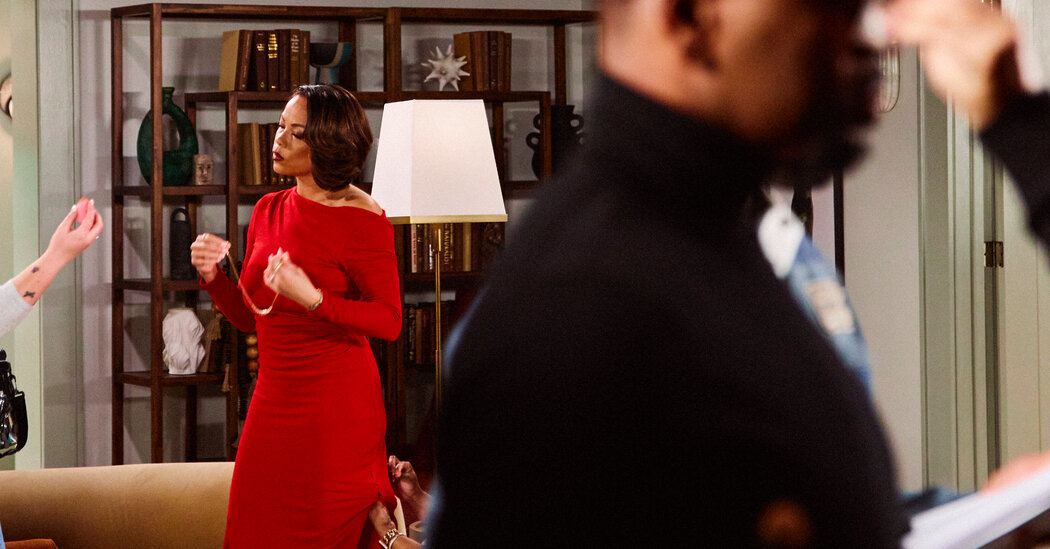Here is the plain text result:
As a student at Yale, Sheila Ducksworth often rushed home to indulge in two favorite guilty pleasures. She’d stop for dessert at Durfee’s Sweet Shoppe before catching up on her soap operas with a friend.
She had grown up watching her stories. “Generations,” the NBC soap opera that debuted in 1989 and the first to highlight a Black family from its inception, became must-watch television while she was in college. She saw herself in the characters, and she yearned for the 30-minute show, ultimately short-lived, to be stretched into a daily hour like most other soaps.
Ducksworth started a career in television production with the idea of one day producing a soap opera even as they began to disappear from the airwaves. In 2020, with her treasured daytime serials still front of mind, she agreed to lead a new partnership between CBS and the N.A.A.C.P., and immediately set out to resuscitate the faltering genre.
That doggedness will result in something that has not occurred this century: a daytime soap debuting on a major television network. “Beyond the Gates,” premiering on Feb. 24, will be the first since NBC introduced “Passions” in 1999. And it will be the first ever that’s completely centered on a Black family.
Historically, soap operas did not just baptize lifetime viewers. Devotion was familial, passed down like genetic material, one generation to the next. Allegiances were pledged and honored, similar to fandom for a preferred sports team.
They provided “something we could kiki and gossip about,” Val Jean said.
Over time and with improved technology and new formats, viewership habits shifted and fractured.
So-called reality trumped fantasy. Soap operas had presented what people always wanted to say but never could. Reality television came along and suddenly people were saying (and throwing) what had previously been left unsaid (and untossed).
The O.J. Simpson murder trial 30 years ago may have initiated soap’s free fall when it diverted daytime eyeballs to the televised trial of the century. “Jerry Springer” free-for-alls quickened the decline. The rise of the Kardashian and Real Housewives empire further accelerated the soap opera’s downward spiral.
It is really hard to launch a new soap and to build the kind of loyalty that the others now have,” said Elana Levine, author of “Her Stories: Daytime Soap Opera & US Television History.” “Even the youngest is nearing 40 years on air.”
The questions popped in Karla Mosley’s mind as she weighed whether to vie for a role on “Beyond the Gates”: Did she want to move from California to Georgia? Would her family come now or later? Would her daughters attend a new school or be home-schooled?
As Mosley contemplated family, the actress Daphnée Duplaix had nearly quit show business. The pace and commitment of a soap is unlike anything else in television. More than 250 episodes annually is still the norm in a landscape where eight-episode seasons of prestige television every other year is often the norm.
But none of the actors felt that they could say no to the opportunity. The series will depict all ages and races. And with two Black women in creative control, a collective mix of ownership, pride and excitement is palpable among the cast and crew.
Clifton Davis was pondering retirement after nearly 50 years of acting. A veteran of stage and screen, he’s happy he took one more role. “You ever go to work, and a smile bursts on your face when you’re walking in the door?” Davis asked. “You know that’s a good job.”
The costume designer Jeresa Featherstone anticipated receiving new actors who would begin the next day. She would shop for their outfits that evening. Before filming, Duplaix found comfort sitting in Wankaya Hinkson’s chair as the stylist worked on her hair. Hinkson said she hopes to have all textures of Black hair displayed on the show.
This is a multicultural show,” said Tunie, who starred for years on “Law & Order: Special Victims Unit.” “There are White people, Latin people, Asian people, and that’s groundbreaking, too, because it’s representing everyone. But this Black family is the central family, and everything springs from there. That’s very different than anything I experienced before.
Val Jean wrote on “Generations,” the show Ducksworth once adored. “You know I wrote that cat fight, right?” she asked during an interview, a sly smile creeping across her face. That scene, in which the actresses Vivica A. Fox and Jonelle Allen punch and grapple with each for a full two minutes while bringing destruction to a fancy living room, has achieved status as a canonical moment in soap opera lore. But the show itself lasted just two seasons, signifying what the author Levine calls the genre’s “checkered history of centering Black characters.”
It was Fox who introduced Ducksworth and Val Jean more than 20 years ago. Ducksworth told her of her dreams of making a soap. Val Jean by that point was one of soap’s most prolific writers, most notably for “General Hospital” and “The Bold and the Beautiful.” As Ducksworth contemplated accepting the CBS job, she reached out to Val Jean and asked her to start imagining a world revolving around a sprawling Black family of influence.
I wanted to see a big Black family that’s rooted in their love for each other, and they’re accomplished and they’re smart and they’re rich and they’re not downtrodden,” Val Jean said. Even as she built out the characters, it was hard to envision the show becoming a reality, despite Ducksworth’s reassurances.
Her enthusiasm swelled once production started. That was apparent to Tunie, who first appeared on “As the World Turns” back in 1987, and has seen her share of television productions in the almost 40 years since. “This,” Tunie promised, “is not your grandma’s soap opera.”
Source link




